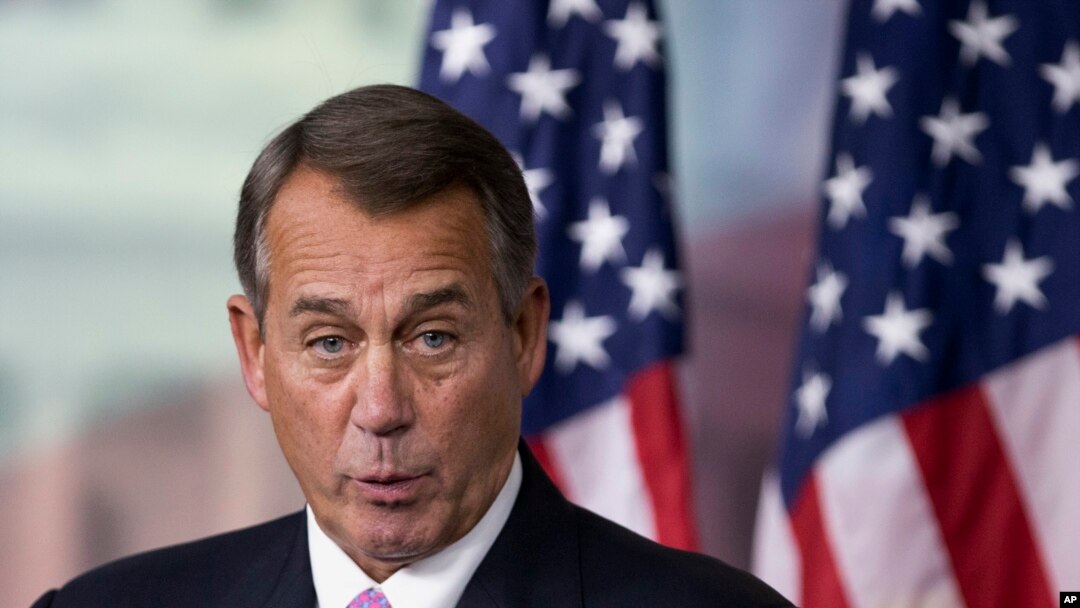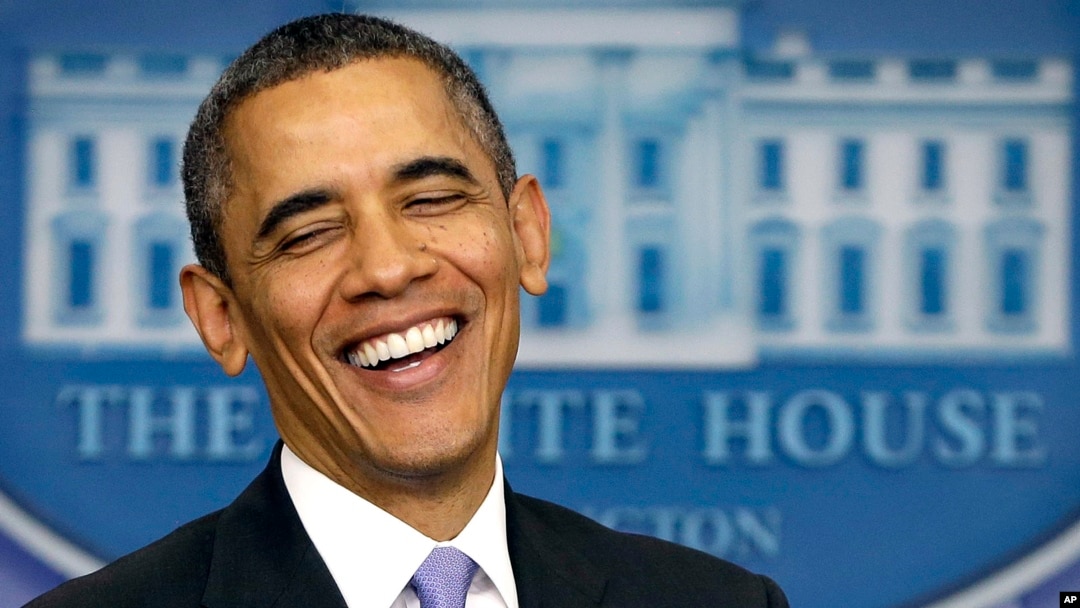WASHINGTON —
2013 was a contentious year in U.S. politics, and public approval ratings for President Barack Obama as well as Democrats and Republicans in Congress were all down at year’s end. Political analysts say the prospects for 2014 are not much better, especially since both major political parties will be positioning themselves for midterm congressional elections in November.
At the end of 2013, nobody looked good in public opinion polls. President Obama’s approval rating had fallen to new lows, in large part because of the troubled launch of his signature health care reform law.
Ratings for Congress and both political parties were also poor. Democrats were dragged down by the problems with the health care law and Republicans were blamed for an unpopular 16-day government shutdown in October.
2014 is a congressional election year in the United States, and that holds a measure of risk for President Obama, says John Fortier of the Bipartisan Policy Center in Washington.
“Certainly the president is falling into the trap that many second term presidents do. There is divided government. He is not as popular. The midterm election doesn’t usually go so well for the president in office in the second term or the first term. So I think there are some challenges for the president,” said Fortier.
Obama is hopeful that a bipartisan budget agreement at the end of the year will make 2014 less confrontational. The agreement came just weeks after a government shutdown that shook public confidence in Washington’s ability to govern.
“This is not what the American people think is acceptable. They want us to try to solve problems and be practical, even if we can’t get everything done,” said Obama.

“It’s not everything we wanted. But our job is to find enough common ground to move the ball down the field on behalf of the American people who sent us here to do their work," Boehner said following the budget talks.
The budget deal has some analysts predicting a less confrontational Washington in 2014, as both parties seek to win back the trust of voters in advance of the November elections.
But it’s likely that the president’s health care law, which Republicans like to refer to as Obamacare, will remain a point of contention between the two parties.
The administration is pressing to fix implementation problems with the law - problems that could do political damage to congressional Democrats if they persist close to the November elections.
Stuart Rothenberg is an independent political analyst in Washington.
“The problem is, all these Democrats supported and in most cases voted for Obamacare and so they are stuck with this and to the extent to which the president is weakened, the voters tend to say, I am going to send a message to Barack Obama. He is not on the ballot in the midterm. The only way they can do that is to vote against Democrats,” he said.
But Rothenberg is also quick to point out that Republicans remain on the defensive after getting most of the blame for the government shutdown in October.
“The Republican brand is still terrible. People think the Republicans made a huge mistake shutting down the government and most Republican strategists will tell you they made a huge mistake.”
President Obama’s approval ratings of late have been the lowest of his presidency and low presidential approval ratings often signal trouble for the president’s party in midterm elections.
But Obama remains a potent political force, says analyst Rhodes Cook.
“The president, regardless of what else he does not have going for him, does have the ‘bully pulpit’ of the White House going for him that commands media attention, commands national attention, and basically can say and do things that force the rest of the government to react,” said Cook.
The outcome of the November elections could determine whether Mr. Obama will have a chance to enact his agenda in the final two years of his presidency. All 435 seats in the House of Representatives will be at stake in the election, along with one third of the 100 seats in the Senate and 36 state governorships. Republicans currently control the House while Democrats hold a majority in the Senate.
At the end of 2013, nobody looked good in public opinion polls. President Obama’s approval rating had fallen to new lows, in large part because of the troubled launch of his signature health care reform law.
Ratings for Congress and both political parties were also poor. Democrats were dragged down by the problems with the health care law and Republicans were blamed for an unpopular 16-day government shutdown in October.
2014 is a congressional election year in the United States, and that holds a measure of risk for President Obama, says John Fortier of the Bipartisan Policy Center in Washington.
“Certainly the president is falling into the trap that many second term presidents do. There is divided government. He is not as popular. The midterm election doesn’t usually go so well for the president in office in the second term or the first term. So I think there are some challenges for the president,” said Fortier.
Obama is hopeful that a bipartisan budget agreement at the end of the year will make 2014 less confrontational. The agreement came just weeks after a government shutdown that shook public confidence in Washington’s ability to govern.
“This is not what the American people think is acceptable. They want us to try to solve problems and be practical, even if we can’t get everything done,” said Obama.

House Speaker John Boehner of Ohio speaks during a news conference on Capitol Hill in Washington, Thursday, Dec. 5, 2013.
Republican House Speaker John Boehner also sounded a conciliatory note in the wake of the budget deal.“It’s not everything we wanted. But our job is to find enough common ground to move the ball down the field on behalf of the American people who sent us here to do their work," Boehner said following the budget talks.
The budget deal has some analysts predicting a less confrontational Washington in 2014, as both parties seek to win back the trust of voters in advance of the November elections.
But it’s likely that the president’s health care law, which Republicans like to refer to as Obamacare, will remain a point of contention between the two parties.
The administration is pressing to fix implementation problems with the law - problems that could do political damage to congressional Democrats if they persist close to the November elections.
Stuart Rothenberg is an independent political analyst in Washington.
“The problem is, all these Democrats supported and in most cases voted for Obamacare and so they are stuck with this and to the extent to which the president is weakened, the voters tend to say, I am going to send a message to Barack Obama. He is not on the ballot in the midterm. The only way they can do that is to vote against Democrats,” he said.
But Rothenberg is also quick to point out that Republicans remain on the defensive after getting most of the blame for the government shutdown in October.
“The Republican brand is still terrible. People think the Republicans made a huge mistake shutting down the government and most Republican strategists will tell you they made a huge mistake.”
President Obama’s approval ratings of late have been the lowest of his presidency and low presidential approval ratings often signal trouble for the president’s party in midterm elections.
But Obama remains a potent political force, says analyst Rhodes Cook.
“The president, regardless of what else he does not have going for him, does have the ‘bully pulpit’ of the White House going for him that commands media attention, commands national attention, and basically can say and do things that force the rest of the government to react,” said Cook.
The outcome of the November elections could determine whether Mr. Obama will have a chance to enact his agenda in the final two years of his presidency. All 435 seats in the House of Representatives will be at stake in the election, along with one third of the 100 seats in the Senate and 36 state governorships. Republicans currently control the House while Democrats hold a majority in the Senate.


